Most insurance policies cover four main items: Emergency repairs, primary repairs, loss of use, and personal property damage. These four types of coverage may be independently paid or bundled in one payment. In the case that the damage to your home required emergency repairs or rendered it uninhabitable (known as loss of use), you may ask for reimbursement for such costs under many policies. Such issues are required to be immediately addressed, so typically you shouldn’t have to wait for an adjuster prior to taking action. Rather, you should save the receipts for all expenses related to the damage and submit them to the insurance company along with your claim. Depending on your specific policy, this amount is generally covered in part or whole.
How Much Does Insurance Cover?
How much non-emergency repairs amount to is established after you file your claim and the insurer finishes investigating it. The company will send an adjuster to your property to view the damage and determine how much of it is covered by insurance. The adjuster will also evaluate your damaged personal property to decide if insurance covers the replacement. The adjuster may also offer an immediate estimate regarding how much it costs to repair. You have the choice to accept this estimate, or to work with your insurer and find qualified contractors. A lot of home insurance contracts allow you to use the estimate or final cost of the work of approved contractors to come up with a final amount. The solution you choose can have a significant impact on how your claim is paid.
How To Receive Your Funds
Insurance companies typically mail payments in the form of checks, as it lets them send a letter with a full breakdown of your policy’s coverage and what the check entails. In certain situations, they may also deliver the funds via direct deposit. It’s likely you’ll get more than one payment, so thoroughly read any information your insurer sends before worrying about underpayment. The payment check may be made out to different parties depending on the circumstances, including:
- The homeowner: If you own your home outright, you’ll probably get a check solely made out to you.
- The name insured: If multiple parties are named in your insurance policy as insured, their names may also be included on the check.
- Your condominium or mortgage management company
- Your contractors: If you choose to use an Assignment of Benefits, insurance payments may be directly made to the contractors who are working on your home
What If My ClaimIs Underpaid?
If your insurer genuinely underpays your claim and isn’t fulfilling its contractual obligations, here are some steps to take:
- Get a second opinion
- File a dispute
- Take legal action
An Insurance Attorney Can Ensure Your Claims Are Honored
Fixing your home is a stressful thing to do on its own, and the last thing you need is to fight with the insurance company if they’re underpaying your claims. Call BCN Law Firm to speak with an experienced property insurance attorney and get the compensation you pay your premiums faithfully for.

